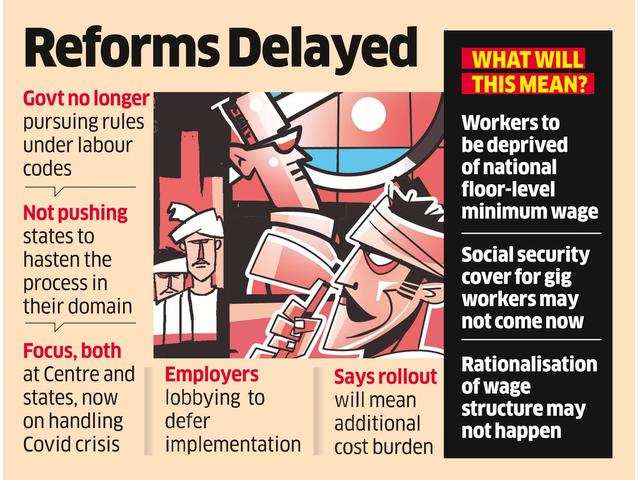![]()
Implementation of big-ticket labour reforms could get pushed to next year as most state governments are going slow on readying the rules framework for implementation of the four labour codes. India Inc also is also reluctant to take on the additional cost and compliance burden under the codes amid the second wave of the Covid-19 pandemic.
The Centre is no longer pursuing states to hasten the process of framing rules for the four codes, as the focus has shifted to healthcare at a time when almost all states are struggling to keep the spread of the pandemic under control, said a senior government official.
“Priorities have changed. It doesn’t look like states will be ready with the rules anytime soon,” said the official, who did not wish to be identified.
While the Centre is non-committal on the fresh date for rolling out the labour codes, industry executives and experts said it is unlikely to be before the next financial year.
“We are in talks with the government to defer the roll-out of the codes to next year as the majority of companies across sectors do not have enough resources to bring about the commensurate changes,” a representative of an industry body said on condition of anonymity. “With changes in the definition of wages and stringent working conditions, the cost to companies will go up on various accounts once the codes are implemented, and the industry is not prepared to take on any additional burden.”
The labour ministry has consolidated 29 central labour laws into four labour codes – the code on wages, the social security code, the industrial relations code, and the occupational, safety, health and working conditions code.
The Centre had initially intended to roll out the codes from April 1 this year and had put in place the rules for the four codes. However, it is waiting for a handful of states to come on board with the rules in their domain to avoid any legal void at the time of implementation of the codes.
Labour economist and XLRI professor KR Shyam Sundar said the implementation of labour codes has taken a back seat, with energies of both the Centre and state governments diverted to handle the health crisis. “Perhaps, industry is also lobbying with the government to defer the implementation of the codes, especially the code on social security and the wage code, as they would have substantial financial implications on the employers,” he said.
The wage code and the social security code will have a significant impact on the cost of employment. The government has capped allowances at 50% of the wages which is expected to lead to higher gratuity payout by employers.
We are providing practical training (Labor Laws, Payroll, Salary Structure, PF-ESI Challan) and Labor Codes, Payroll Consultant Service & more:
- Labor Law + Payroll-Practical-Training: https://oneclik.in/labor-law-payroll-practical-training-certificate/ (PF, ESI, Bonus, Payroll & more)
- Labor Code, 2020 (Crash Course): https://oneclik.in/labor-code2020-rules-practical-training-certificate-crash-course/
- Labour Code | Labour Bill (Labour-Law-Practical-Training): https://oneclik.in/labour-law-practical-training/ (Factory, Contact Labor, Maternity Act & more)
- PF – ESI Consultant Service: https://oneclik.in/pf-esi-consultant-service/
- Labor Law, Compliance & HR – Payroll Management
- Advance Excel Practical Training: https://oneclik.in/advanced-excel-practical-training-certificate/
Get Latest HR, IR, Labor Law Updates, Case Studies & Regular Updates: (Join us on Social Media)
- Telegram Channel: “One Clik”
- Whatsapp Group: https://wa.me/919033016939
- Facebook: One Clik
- Linkedin: One Clik
- Instagram: oneclik_hr_management
- YouTube: One Clik

